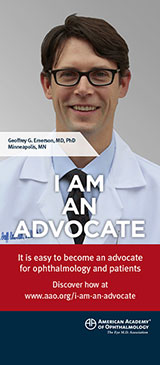 While the number of ophthalmologists in the United States and in each state is relatively small, the number of patients served by them is quite large. These patients are very vocal and persuasive to a legislator when they explain how vision loss affects them personally. Patients enjoy discussing their health care, and they appreciate the opportunity to participate in advocacy. This is especially true when the topic affects them directly. Our advocacy efforts can benefit from the millions of individual voices of our patients.
While the number of ophthalmologists in the United States and in each state is relatively small, the number of patients served by them is quite large. These patients are very vocal and persuasive to a legislator when they explain how vision loss affects them personally. Patients enjoy discussing their health care, and they appreciate the opportunity to participate in advocacy. This is especially true when the topic affects them directly. Our advocacy efforts can benefit from the millions of individual voices of our patients.
When a 2013 regulation blocked clinic access to Avastin and other compounded medicines, retina doctors in Minnesota engaged patients to voice concern to our legislators. The Minnesota Academy of Ophthalmology produced a one-page handout for patients, including background about the issue, contact information, and suggested topics for patients to share with their senators. Retina clinics recruited patients, resulting in approximately 1,000 of them contacting the offices of their senators via email or telephone during a two-week period. This grassroots patient advocacy occurred as the Compounding Quality Act moved through the U.S. Senate, and helped to achieve significant improvements in the bill. Advocacy by patients is particularly impactful because a patient can tell a personal story.
By engaging patients, we can leverage our impact on the legislative process. It is also rewarding to empower our patients and to advocate alongside them to improve health care.
Patients appreciate knowing their doctor is trying to help. A year after the Avastin advocacy effort, patients who wrote letters still ask me, ‘Doc, how goes the effort in Washington, D.C.?’ Many patients were extremely grateful to be involved in the process. There is no political action committee or lobbyist dedicated to serve the interest of ophthalmology patients. If we don’t look out for our patients, who will?
Geoffrey G. Emerson, MD, PhD, is in private practice at the Retina Center of Minnesota, and is department chair of the Phillips Eye Institute and assistant professor at the University of Minnesota.